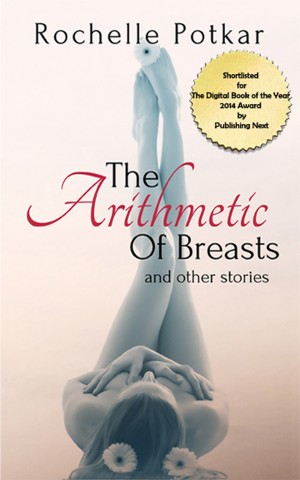Interview with Rochelle Potkar
Published 2013-10-25.
Do you remember the first story you ever wrote?
I wrote my first story, 'Tropical Estuary' in 2005 as part of a 2-day writing workshop at an Art Festival.
I had been to Surat, a place in Gujarat, India for the turn of the year and as a part of sightseeing had landed in front of an estuary. While observing it, I wondered how the merging of river and sea could be so silent, compared to the noise of sea and river separately.
I came home and wrote out this story. When it got selected at Sein und Werden, not a word was replaced or edited. That gave me some confidence.
This story, though written first, wasn't the first to get published.
How do you approach cover design?
This is a zero-capital project and I did know a bit of Photoshop. Visualization too is not very difficult for any human on this planet, and so I did this cover design myself.
Hundreds of thoughts have been expended on how cover design is important. I like what somebody said: a cover design should transmute the whole feeling of your book.
What are your five favorite books, and why?
Kafka on the Shore
The God of Small Things
Brick Lane
A Fine Balance
Lanark: A Life in Four Books
What do you read for pleasure?
Online fiction from journals and magazines
What book marketing techniques have been most effective for you?
Of late, marketing has become the writer's job. I have a small, zero-budget marketing plan which is largely online. Let's see how it works. I'll update this space later.
Where did you grow up, and how did this influence your writing?
I grew up in a town called Kalyan where the clocks ticked in the opposite direction. I hated its lethargy. I hated the fact that nothing encouraging would really happen there.
But now as a writer, if I take a trip down childhood lane or membrane, I always land up in Kalyan metaphysically. (I haven't physically visited it for years). But that is the only place I know. That is the place where some of my characters spend their childhood, or have an old relative living..
Small towns are crucibles for studying humanity. They are like petri dishes. In novels, this is the same isolation we often seek with our characters.
Though I can't say I love Kalyan. The better way is to own up I grew there.
When did you first start writing?
In 2005, when I was working in e-learning as a content writer, I wrote my first short story. Before that I had no clue I would end up a writer. I wasn't even an avid reader or a literature student. [I studied commerce - that's where the money was, at least, on paper.]
It was scary. I was 27 and grossly unhappy with my corporate life. Yet it paid well and had a career ladder and performance appraisal systems and grids and mazes of projects and colleagues and cakes and office parties and a vending machine for coffee.
To leave all that and be a writer earning nothing, was thrilling. Writing not only thought me brevity with words but also costs. I cut expenses. I recycle my saris into gowns and eat fruit when hungry. (So no cooking!)
What motivated you to become an indie author?
Money, Time and an Empty bucket chair
Money: Royalties of 70% versus 8% sounds good at least in the sounding of it, whether mammoth sales happen or not is another matter.
Time: Attention levels are reducing. Patience, too, is reducing.
I am done with standing in long queues only to be told I was on a shortlist or longlist before getting my stories back. What happens is the stories keep piling and the fear that those pillars will fall over you one day and smother you. Inventory was made to keep moving. Movement is life-force, dynamism. I am immune to the feelings of failure or rejection, but susceptible to what happens after that. Stocks pile. Stagnation sets in. A kind of suffocating engorgement.
I want nothing more than for my inventory to move, and fast. So I can write more and not be bothered about decaying files on my computer, and whether their latest versions have been saved or not.
It's like getting rid of nasal congestion, breathing easy, sleeping, and dreaming peacefully.
Bucket Chair: I am not averse to brick-and-mortar real world publishing. Even though my unguarded instincts are that of a loner and an introverted person. In fact, I do hope to sip wine with a witty agent someday.
But the empty chair in all the book launches have frightened me the most - becoming a motif of disinterest. I am always wondering who was supposed to be in that seat. Why isn't it occupied? Where is the person who it was meant for? Dining somewhere? Watching a movie? At home? In bed with someone? At a play?
Empty chairs silently haunt at book launches.
There are no empty chairs in indie publishing. There might be no sales. But that can be anywhere.
What is the greatest joy of writing for you?
Writing is storytelling.
Storytelling is talking when no one's listening.
Storytelling is breathing.
- A Sense of being alive.
What are you working on next?
Three more clusters of short stories.
1. Women-oriented
2. Ghost
3. Assorted
Then, I have a speculative novel.
Smashwords Interviews are created by the profiled author or publisher.

